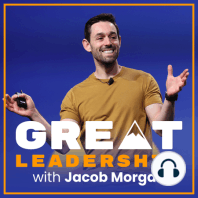76 min listen

How to Solve Problems Before They Happen
How to Solve Problems Before They Happen
ratings:
Length:
64 minutes
Released:
May 4, 2020
Format:
Podcast episode
Description
Leaders especially are constantly running around trying to "put out fires." But, what if there was a way to stop the fires from happening to begin with? That is the premise of Dan Heath's new book: Upstream: The Quest to Solve Problems Before They Happen. Dan is the best-selling author of six books five of which he wrote with his brother Chip Heath (who I had on my podcast a little while ago). These books include classics such as: Made to Stick, Switch, and The Power of Moments. How do we stop chasing fires and start preventing them? It's all about Upstream thinking. You can listen to the full in-depth conversation with Dan below This episode is brought to you by Cisco Webex. To help companies navigate the new reality of remote work, join us for a live future of work marathon series with customers and industry experts: #RemoteWork - The Future of Work is Now. The Upstream Parable Back in 2009 Dan heard a parable that is well known in public health and it really resonated with him. It is what inspired him to write the book. He tells it like this, “You and a friend are having a picnic on the bank of a river. And you've just laid down your picnic blankets, you're about to have your meal when you hear a shout from the direction of the river. You look back and there's a child thrashing around in the water, apparently drowning. So you both dive in, you fish the child out, you bring them to shore. Just as you're starting to calm down you hear another shout. You look back, there's a second child splashing around again, apparently drowning and so back in you go. You fish them out, then there are two more children who come along right behind and so begins this kind of revolving door of rescue, where you're in and out, and fishing kids out and it's exhausting work. And right about that time, you notice your friend is swimming to the shore, steps out, starts to walk away as though to leave you alone, and you cry out, "Hey, where are you going? I need your help. All these kids are drowning" and your friend says, "I'm going upstream to figure out who's throwing all these kids in the river." And that is the problem with most organizations. We are too focused on our own work and trying to quickly solve any issues that come up in order to just keep moving forward - we reward busy work. The result is an endless cycle of putting out fires as they come, when instead we should be able to recognize recurrent problems so we can get to the root cause. If we can find out how to fix the systems that cause the problems in the first place, we would save so much time and energy. How to move from downstream thinking to upstream thinking Inside of most companies employees are divided into separate functions--marketing stays in the marketing department, sales in sales, HR in HR and so on. This setup is not conducive for upstream thinking as it keeps everyone secluded and not working together to address problems. As Dan told me: "Focus in organizations is both an enemy and an ally. It's an ally in the sense that when we get people focused on particular measures or a particular area of responsibility, it makes them more efficient. But, focus is also an enemy in the sense that it blinds you to things that are just slightly outside of your box." Dan gives a great real life example from the travel website, Expedia. One employee working in the customer experience group was looking through some data from their call center and he found that for every 100 people who booked a flight through their site, 58 of them were calling for help. This employee saw something wrong with that picture, since the company’s whole business model is self service travel planning. Call center agents are focused on things like reducing call time and the number of issues, they don't ever ask "hey, how can I keep Jaco from calling to begin with?" What this employee discovered was the number one reason people were calling was to get a copy of their itinerary, which should be an easy task
Released:
May 4, 2020
Format:
Podcast episode
Titles in the series (100)
Digital Upskilling: How PwC Is Ensuring No Employees Get Left Behind In The Digital Revolution: With Mike Fenlon, Chief People Officer at PwC US by Great Leadership With Jacob Morgan